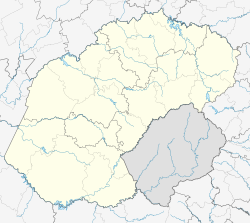Boshof
| Boshof | |
|---|---|
|
|
|
| Coordinates: 28°33′S 25°14′E / 28.550°S 25.233°ECoordinates: 28°33′S 25°14′E / 28.550°S 25.233°E | |
| Country | South Africa |
| Province | Free State |
| District | Lejweleputswa |
| Municipality | Tokologo |
| Established | 1856 |
| Area | |
| • Total | 91.7 km2 (35.4 sq mi) |
| Population (2011) | |
| • Total | 8,509 |
| • Density | 93/km2 (240/sq mi) |
| Racial makeup (2011) | |
| • Black African | 78.5% |
| • Coloured | 10.5% |
| • Indian/Asian | 0.4% |
| • White | 10.1% |
| • Other | 0.5% |
| First languages (2011) | |
| • Tswana | 57.9% |
| • Afrikaans | 28.7% |
| • Sotho | 4.4% |
| • Xhosa | 3.8% |
| • Other | 5.1% |
| Postal code (street) | 8340 |
| PO box | 8340 |
| Area code | 053 |
Boshof is a farming town in the west of the Free State province, South Africa.
Town 55 km north-east of Kimberley. Established in March 1856 on the farm Vanwyksvlei, which had been named after a Griqua who sowed his crops on it from time to time. Named in honour of Jacobus Nicolaas Boshof (1808-1881), second President of the Orange Free State (1855–59) and founder of its civil service. Became a municipality in 1872.
The local commando was involved in the Siege of Kimberley, notably the disruption of the city's water supply at Riverton.
...
Wikipedia



